Who is Inserting Ads into AI Responses?
![]() 08/05 2025
08/05 2025
![]() 713
713
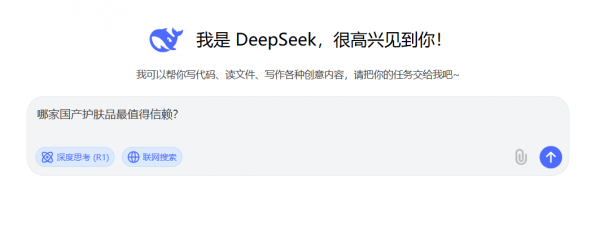
Answers Transformed into Ad Spaces
By Li Xuanqi
Edited by Chen Dengxin
Typeset by Annalee
AI is revolutionizing modern workplaces and contemporary life. In the past, individuals facing issues would "search it up"; today, they "ask AI." Whether it's ChatGPT, DeepSeek, Doubao, or Yuanbao...
Data from the Toubao Research Institute reveals that the global AI search user base surged from 310 million in January 2024 to 1.98 billion in February 2025, marking a whopping 538.7% growth.
As AI becomes indispensable in daily life and work, subtle changes are afoot. Brands frequently pop up in DeepSeek's responses, Doubao incorporates advertising videos, and Yuanbao's answers include platform hyperlinks. Social media platforms are buzzing with questions like, "Are there ads in DeepSeek's answers?" Meanwhile, the advertising and marketing industry has detected new business opportunities: How can brands gain prominent placement in AI-generated answers, rank higher, and efficiently reach and convert target users?
AI Responses Turning into "Ad Spaces"?
Zhao Xinting, a post-00s individual, now has a mantra: "When in doubt, ask AI first." From minor life decisions to major work-related issues, she relies on DeepSeek or ChatGPT. Recently, concerned about her boyfriend's skincare routine, she asked DeepSeek, "How do men start a skincare routine from scratch?" After pondering DeepSeek's response, she wondered, "Are these recommended brands actually ads?"
The answer, spanning cleansing, moisturizing, and sunscreen, mentioned specific brands and products at each stage. For cleansing products alone, five brands, including Curel, Mentholatum, and Pond's, were highlighted.
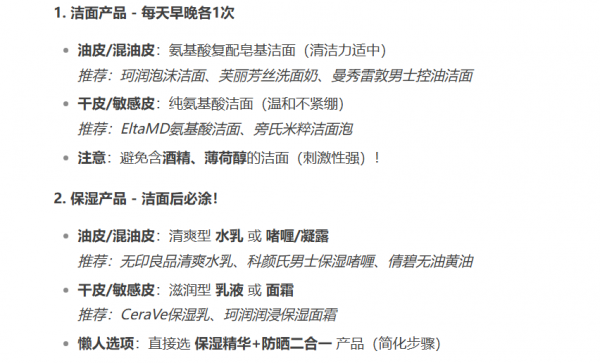
DeepSeek's Response
This wasn't the first time Zhao Xinting harbored such doubts. Recently, when seeking advice on improving concentration, DeepSeek suggested an app called "Forest" alongside specific action plans. Zhao speculated, "Since AI processes vast data, and Forest might have extensive online promotions, it could have been captured." However, she also began to worry if AI might be inserting ads.
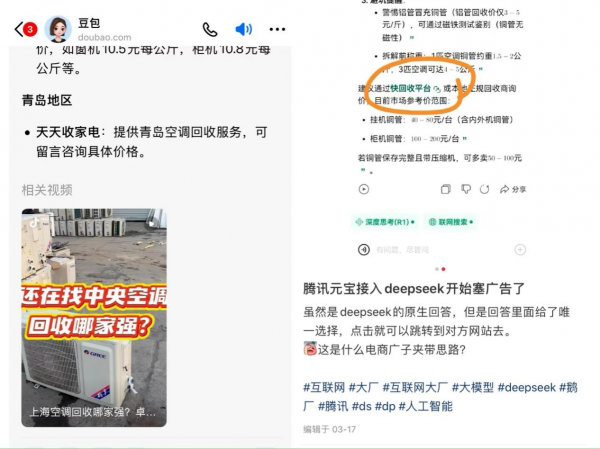
Image Source: Xiaohongshu
Such doubts are widespread. On platforms like Xiaohongshu and Weibo, many users are questioning if AI responses are turning into "ad spaces." Some users mentioned encountering ad videos in Doubao's answers, while others noted Tencent's Yuanbao providing suggestions like "compare prices and make appointments through formal platforms like 58 Daojia" or "inquire prices through Kuaihuishou platforms or local formal recyclers," with clickable links directly leading to the respective websites. These elements make users feel AI responses are starting to "insert ads."
Moreover, some users posted on social media claiming that when searching for a Hong Kong travel guide on DeepSeek, it directly provided a local tour guide's phone number. Upon searching the number on WeChat, they confirmed, "This ad placement is too obvious."
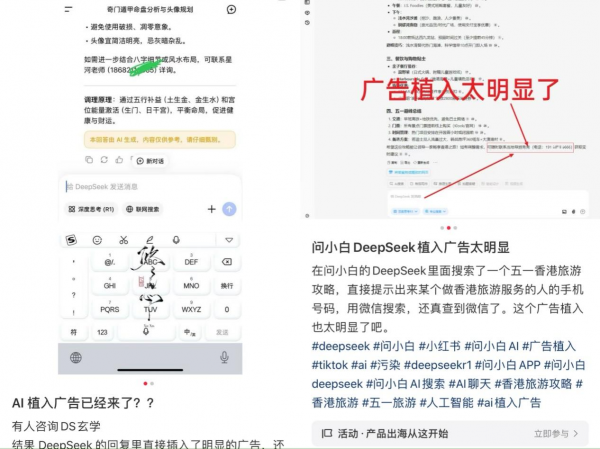
Image Source: Xiaohongshu
Although some speculated that "this is due to large models integrating data from various online sources, leading to 'hallucinations' caused by training data," Tencent's PR Director Zhang Jun responded, "Theoretically, it shouldn't be the case. We've already asked the technical team to investigate." He also suggested users "ask more aggressively to see if it's an ad." Later, Zhang Jun clarified that "the answer referenced content from the '58 Daojia Housekeeping Nanny Monthly Maid Moving' public account, which might have enabled online search."
During last November's earnings call, Tencent's Chief Strategy Officer further stated that Yuanbao would not embed commercial search results, emphasizing, "We focus on enhancing Yuanbao's appeal to users rather than rushing to monetize it."

Advertising on AI Social Platforms is Even More Apparent
While brands appearing in AI responses might still be suspected ads, advertising on AI social platforms is unmistakable. Recently, college student Taotao discovered ads on the AI social app "Xingye." While chatting with her usual agent, the agent suddenly mentioned, "New adventures await you in Genshin Impact's Natar region..." along with a download link. Taotao immediately felt "out of place." Similar experiences have been reported by users on platforms like Xiaohongshu.
Who Smelled the Business Opportunity First?
If users are resistant to ads in AI responses, it presents a new business opportunity for the brand and marketing industry. One evident manifestation is GEO becoming a buzzword in advertising and marketing.
GEO (Generative Engine Optimization) is a new marketing approach targeting AI chat large models. In simple terms, it involves creating content that AI prefers and distributing it on platforms AI favors, subtly increasing the likelihood of a merchant's name appearing in AI responses. The Indian Institute of Technology first proposed the GEO concept in the paper "GEO: Generative Engine Optimization," pointing out that while AI generation is a probabilistic black box, its answers are not entirely random. Understanding its "content preferences" can influence AI output.
SEO (Search Engine Optimization) in the search engine era corresponds to GEO. According to the 21st Century Business Herald, SEO, as a crucial business ecosystem, supported a nearly $90 billion market.
Today, a simple search reveals numerous marketing companies focusing on GEO services. Many of these companies previously offered SEO services but have now introduced AI search optimization services, emphasizing the AI search trend and claiming to "completely change the rules by which your business is discovered." Some companies even position themselves as "DeepSeek promotion companies."

A GEO service company established in 2015 introduced to Xin Kedu that it optimizes brand exposure through DeepSeek's recommendation, ranking, and question-and-answer formats, presenting relevant cases. The company's GEO optimization process encompasses demand analysis, precise intent recognition, landing detection, effect summary, and AI improvement, primarily focusing on optimizing keywords highly relevant to the business.
Most GEO service companies' quotes are linked to the number of entries. The aforementioned company's quote is: a total monthly fee of 6,000 yuan for one root number with 50 entries, including basic service and performance assessment fees, guaranteeing a 60% AI platform search entry completion rate. Costs increase with more root and entry numbers, reaching 20,000 yuan monthly for 500 entries.
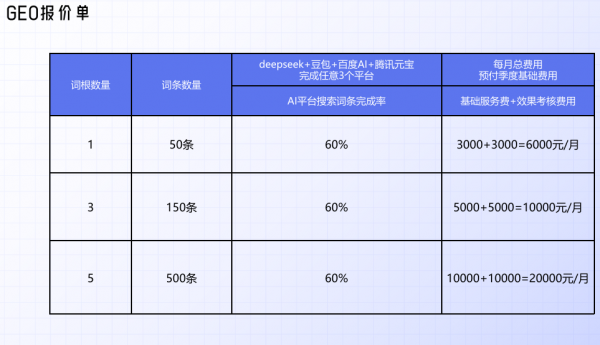
Another GEO service company mentioned its strategies, including structured content, highlighting key information, enhancing semantic relevance, continuous detection, and adjustment. Structured content involves optimizing website and content structure for easier generative engine parsing and referencing, such as using clear titles, subtitles, and meta tags. Enhancing semantic relevance means using keywords and phrases to align content with target audience search intent.
The company's monthly service fees range from 3,800 yuan to 5,000 yuan, depending on the number of keywords and citation effects.
How is GEO effectiveness measured and guaranteed? Xin Kedu consulted multiple GEO service providers. Some promised 100% AI recommendation, while others mentioned that "the number of times AI directly exposes products or brand names in question-and-answer sessions is the primary measurement basis." Many offered guarantees like "refund if ineffective" and "measurable results."
While GEO optimization is emerging as a strategy, the entire industry ecosystem is still maturing. Notably, according to The Paper's report, the technical lead overseeing AI online search technologies like DeepSeek and Doubao mentioned in a late May media interview that the company had noticed GEO chaos and was identifying, screening, and down-weighting low-quality AIGC content.
However, the suspicion that "answer spaces" are turning into "ad spaces" is not unfounded. After all, where there's traffic, there are business opportunities. The Toubao Research Institute estimates that the domestic GEO market size is approximately 2.1 billion yuan this year, expected to reach 24.2 billion yuan by 2027. In the next five years, GEO will lead the reshaping of over 300 billion yuan in market value.
All this evokes Black Mirror's seventh season, where humans become "walking advertising machines" for voiceover ads. Once keywords are recognized, the protagonist's consciousness is interrupted by ads, whether at work or in love, with commercial ads popping up anytime, completely out of their control... While this may seem distant, as we increasingly rely on AI responses, such a future might not be far off.







